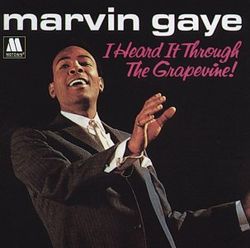Yesterday was April 1st, and the anniversary of Marvin Gaye’s death. I guess rappers are the only people whose deaths become celebration, and we didn’t think to mark that sad day with a post. Happily though his birthday is today and that’s more than enough of a reason to shout out one of the greatest male vocalists of all time.
I’m not going to go the easy route and post a list of Gaye’s songs. Today, we’re going to tell you the winding twisted tales of just one of his immortal songs. Today we tell the tale of “I Heard It Through The Grapevine.” As many of you know, that song was also done with drastic rhythm alteration and arrangement by Gladys Knight & The Pips. What you may not know, is that the song passed through two groups before it even got to Gaye (and an apocryphally rumored third) and his version was shelved until demand, stubbornness and the people made it happen.
The story begins with Barret Strong, the crooner behind Motown’s very first big hit, “Money (That’s What I Want).” That song proved to be his last hit behind the mic, but behind the pen, he continued to get busy. His luck with the ladies must have been as good as his luck with hits because “I Heard It Through The Grapevine” was based on events in his own life. The song was originally intended for The Temptations, who had just scored a hit with “Ain’t Too Proud To Beg.”
I Heard It Through The Grapevine-The Temptations
Problem was, Berry Gordy didn’t think the song was any good. He borderline hated it and vetoed the song. Temptations collaborator Norm Whitfield, who worked on the song with Strong, just wouldn’t let it go. Next stop was a reworking for Smokey Robinson & The Miracles. The same pace was maintained although the drums were less aggressive and the vocal arrangements different. Smokey’s higher pitch gave the song a different energy, but Gordy remained unmoved. The song would not be released as a single, although it did make a later album (1968’s Special Occasion).
Smokey Robinson The Miracles-I Heard It Through The Grapevine (Vinyl)
Strong and Whitfield got in the studio with Marvin Gaye to record a version of the song, and beef with how the song should be delivered arose between Gaye and Whitfield, who preferred the high raspy delivery of David Ruffin on the original Temps rendition. Because Marvin was a soloist, background vocals were laid by Motown’s secret weapons The Andantes, a group of female session singers who sang back ground and actually replaced vocals for many on the classic Motown Records (some replacements were even made by producers without the singers’ knowledge). The slower pace and the female background didn’t necessarily fit for a raspy delivery to Marvin, who stood his ground.
While that was going on, the song was eventually recorded by recent Motown signee Gladys Knight & The Pips, who finally made the song a hit in November of 1967. Knight put a groovier Gospel feel to the song, but that familiar key progression is still present on the bridge.
I Heard It Through The Grapevine_Gladys Knight The Pips
Eventually, Whitfield got his way and Marvin relented to the higher registry. With his new delivery, The Andantes on background, the Detroit Symphony Orchestra on string arrangements (big pimping), and session musicians the Funk Brothers on the bass, Whitfield knew it would be a hit. Again, Berry Gordy could care less. He’d already had Gladys make the record a hit (despite Gordy’s initial refusal to support even her version).
Marvin Gaye-I Heard It Through The Grapevine
Eventually, Whitfield’s persistence paid off. Marvin’s rendition, much to the chagrin of Gladys, was released in 1968 on an album initially titled In The Groove. The song made so much noise and got so many radio requests that it forced Gordy’s hand. Not only was the single released, but the entire album was rereleased with a name change: I Heard It Through The Grapevine.
And there you have it. The little song that could survived numerous Gordy fueled assassination attempts and identity crises. Gaye’s vocal delivery change not only powered the latter half of his career, but the track, with its electric piano rhythm, movie score-styled strings and accompanying guitar, doubling up the piano, inspired Sly Stone and was the first notable song of the psychedelic soul subgenre. Not to mention some rap group from Cleveland that went on to sell monstrous amounts of records(Peep the first few seconds of “Thuggish Ruggish Bone” above. Happy birthday Marvin.
*Bonus – Marvin Gayes first lead vocal appearance on record. 1959 The MoonGlows – “Mama Loocie”
The Moonglows-MAMA LOOCIE-1959
Follow Us on Twitter @ http://twitter.com/planetill
Follow Odeisel on Twitter @ http://twitter.com/odeisel
Join Us on the Planet Ill Facebook Group for more discussion
Follow us on Networked Blogs




